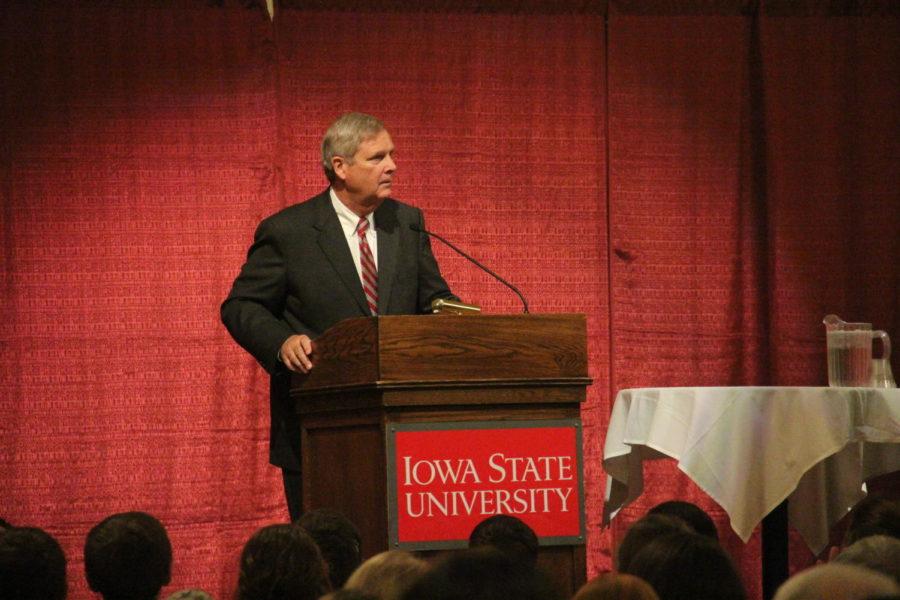Tom Vilsack speaks on trade agreements and the United States agriculture market
Tom Vilsack, former Iowa Governor and Secretary of Agriculture, speaking to Iowa State students about the needs and future of Americas agriculture industry at the Memorial Union on Nov. 16, 2017.
September 4, 2018
Tom Vilsack spoke about international trade relations and the impact on United States agriculture on Tuesday night in the Great Hall of the Memorial Union.
Vilsack is the current president and CEO of the U.S. Dairy Export Council. He formerly served as Secretary of the U.S. Department of Agriculture and also as governor of Iowa.
Mark Rectanus, Iowa State professor, describes Vilsack as “a very strong advocate for forward thinking global perspective for Iowa and the United States.”
Vilsack discussed complexities within agriculture trade and how debates over GMOs, climate change, tariff agreements, diseases and more factors go into trade agreements and often create blockades between countries.
He emphasized how farmers are under stress in today’s economy. Prices for agricultural goods are going down, and while that may seem good to the average consumer, it also means farmers aren’t earning as much.
“Corn may be selling for three dollars a bushel, but if it costs four to put it in the ground, the farmers aren’t earning anything,” Vilsack said.
Another major topic was the recent trade war between the United States and China.
Vilsack said the trade issue in China is not about dollars and cents, but rather a clash of philosophies.
“In America, we patent our inventions and make money off of people that want to distribute those inventions. In China, inventions are more ‘community owned,'” Vilsack said. “This is one way that the trade negotiations with China can be tricky. China might ask for one of our patents to use for themselves, but American philosophies may see that as intellectual theft.”
Vilsack told a story about his first few weeks as governor and how at that time, protests in Seattle at the World Trade Organization were in full swing. He said he tried to get into the headquarters and was “assaulted” by protestors outside the gates.
“This shows you the level of passion people have over trade agreements,” Vilsack said.
Although people may be passionate about trade agreements, Vilsack said that “agriculture in the U.S. is not a number one priority.”
He said this is because of how significant the agriculture population was in the late 20th century, with about 25 million farmers in the industry.
Today, there are a little over 2 million farmers, and Vilsack said about 1.3 million of those are “hobby farmers.” That leaves about 700,000 farmers left in the United States.
Vilsack’s solution to this problem is “by not talking about farm issues without talking about food issues.”
By doing so, Vilsack said this would raise the amount of people in the industry to 43 million.
During the open question forum, a farmer spoke about his troubles keeping his farm afloat in the competitive market and having to eventually close his dairy farm. He had been on the farm for 70 years and attended Iowa State.
Vilsack told the audience that this man is not alone. For many, farming is more of an identity than an occupation. But today, larger farms are beating out small farms.
There was no solid resolution for the farmer who asked the question, but Vilsack said there is a major problem in the United States when transitioning our economy, and compared it to farmers losing their jobs to the inevitable loss of jobs in the taxi and semi driver industry. With self driving cars on the rise, these drivers will be out of a job with nowhere to work.







